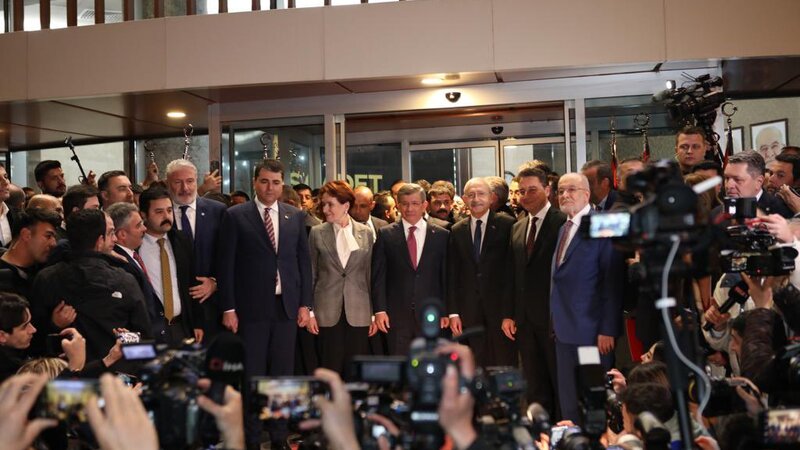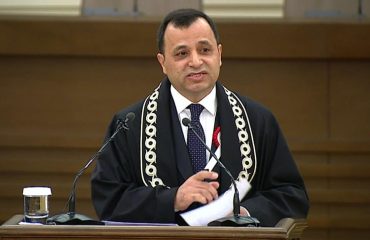

Following a four day feud over İYİ Party Leader Meral Akşener’s defiance that caused a political earthquake at the “Table of Six”, the opposition alliance of six parties announced CHP leader Kemal Kılıçdaroğlu as their presidential candidate on March 6.
In recent days, the political earthquakes in Türkiye have unfairly drawn attention away from the deep pain caused by the physical earthquake which shattered countless lives in the affected regions. Now, with elections just around the corner, political agendas are on full display, rife as usual with brazen moves and strategic gameplay.
The reasons are obvious. This election cycle will be all about voting for an unchecked regime packaged and marketed as a “Turkish-type presidency.” If the powers that be get their way, Türkiye will complete its long transformation from a semi-democracy into a full-blown authoritarian regime. Secularism (at least what’s left of it) will be further eroded and perhaps completely erased. If this happens, our citizens may never witness free elections again.
Voters originally supported the Table of Six alliance (the Altılı Masa) in good faith. They believed such an entity might help prevent the government from achieving its ultimate and unseemly goals. They hoped the alliance might restore our democracy. This hope wasn’t necessarily based on any misguided trust in these six disparate politicians; however, it was never really widely believed such a group could make a truly game-changing move.
Meanwhile, the government has been content to watch the process with arrogant assurance. It has been quite confident that, by playing its usual old games, it can easily undermine the burgeoning trust the opposition is building in the hearts and minds of voters.
The government has always been persistent in its pursuit of policies detached from reality. It focuses on disrupting our human reasoning processes by manipulating our perceptions and distracting us from the truths in front of our very eyes. And, in the wake of the February 6 earthquake, it has doubled down on this worn-out strategy.
Is the iYi Party the target?
Systemic disorganization at the highest levels of our most vital organizations led to an unnecessarily high loss of life following the devastating earthquake. This catastrophe, in turn, has revealed to the world that the narrative of a “great and powerful Türkiye” is, in fact, merely an illusion crafted by a government in the throes of deep anxiety.
The possibility of coming out of the elections bearing the weight of a heavy defeat will increase the danger that its narrative might be questioned. In the face of genuine accountability, the old trick of pulling rabbits out of hats won’t suffice anymore. Instead of more tricks, this time it will be a heavy hammer pulled out of their toolbox… and with that hammer, the democratic alliance of the Table of Six —which was starting to gain at least some ground— will be dutifully crushed.
Realizing the status quo to which it owes its tenuous existence has to be kept at all costs, the government will take action. It will try to uproot the young sapling of democracy which had begun to sprout from the soil of the Table of Six’s garden, by activating all the elements of the party state. It is a radical step the government believes it must take, for the opposition, after all, has to be thoroughly intimidated. Alas, that isn’t hard to do and the iYi Party is the most obvious opposition party to target since its own leader was well-known to have worked closely with supra-political forces for years in the past.
What does supra-political mean?
The party has been an eclectic mix of statist nationalist-conservatives, urban secular center-rightists, and technocrats from the realms of civil society, academia, and the business world. And there are external players, as well. Political formations such as the Vatan, Zafer, and Nationalist Parties were therefore given space, whether on their own initiative or not. Conspiracy theorists rushed from one television channel to another, all too eager to support the government’s irrational policies on air. As these actors are set for the play to be staged, the supra-political state-oriented power can finally strike its hammer down.
There isn’t anyone in this country who doesn’t know what is meant by the phrase “supra-political state-oriented forces.” Moreover, it’s a fact that there is a large capital-owning segment -“bourgeoisie” class, if you will – patronized by these forces yet pretending otherwise. Elements of these state-oriented supra-political forces exist both within the government and the opposition.
Moreover, the extensions of these forces within the intelligence and security bureaucracy must not be underestimated. It is easy enough to look at our recent history to understand who these forces are. Indeed, it is enough simply to examine the ~20 years of AKP rule, to look closely at this party that came to power under the false claim that it would eliminate these forces—when in fact, it would emerge to become their biggest patron.
Forces mobilized, plans disrupted
Recent developments signal that these criminal forces are being mobilized to intervene in politics. With an act as plain as a children’s stage play, the operation to break up the Table of Six is being put into action. However, times have changed. In our 21st century, they’ve continued to rely on outmoded 20th-century tactics, failing to see that they are ill-equipped in this modern age of technology.
The earthquake revealed to the public that its government may be nothing more than a “paper tiger”—seemingly powerful in appearance, yet secretly weak and ineffective. As a consequence, the government’s rhetoric is becoming obsolete and its credibility diminished. No one has anything else left to lose.
But the ruling party’s move to target the Table of Six alliance ensured the “supra-political forces” were caught, red-handed, and for the first time by the public. It further revealed that artificial political narratives have no more chances of success going forward.
When you try to change the natural flow of politics through state intervention, you run the risk of being ridiculed, to say the least. Thus, in my opinion, the operation targeting the Table of Six will yield the precise opposite of what was intended. It will automatically expose those who have been operating secretively.
A rotten structure that does not want to change
If someone asked me to explain what this state-oriented, supra-political regulatory power is, I’d describe it as follows: a group of ultra-conservatives and ultra-nationalists from the Cold War era who are closed to innovation and steeped in corruption. A manipulative, mischievous, and outdated cabal that has existed in secrecy throughout our political history, both in power and in opposition. A group that revels in keeping our nation on the edge of an abyss.
But their aforementioned final moves may, at last, bring about their own end. Clearly, they’ve lost their creativity and appear to be out of ideas. We can only hope that their desperation doesn’t push them into the madness of resorting to violence. Either way, none of us can reverse what has happened, for that is in the past. At this point, our goal must be to ensure that the elections are conducted legitimately, to prove to ourselves—and to the world that is watching—that Türkiye has the democratic maturity to realize a possible transfer of power peacefully.


